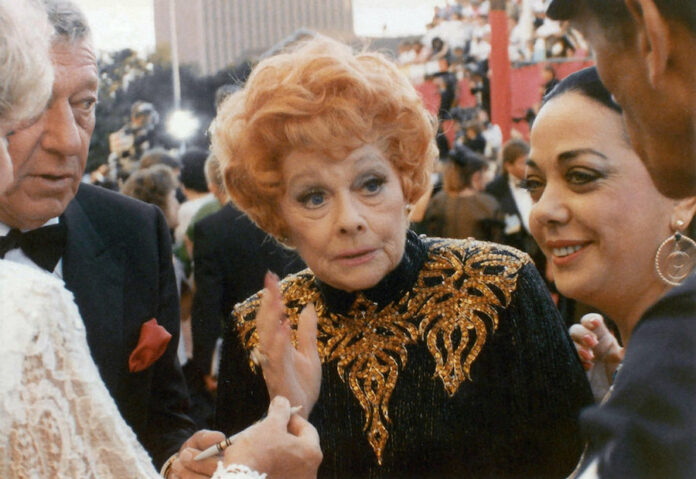![ALAN LIGHT [CC BY 2.0] / WIKIMEDIA COMMONS](https://theaggie.org/wp-content/uploads/2016/11/lucy_op.jpg)
 The successes and failures of a revolutionary 1950’s sitcom
The successes and failures of a revolutionary 1950’s sitcom
I Love Lucy, a TV show from the 1950’s, is often regarded as the show that changed sitcoms forever. I was not aware of this, or any of the thematic and topical issues at play in I Love Lucy, when my family and I watched episode after episode rented from the local video store.
All I knew about I Love Lucy at 8 years old was that it was funny, it made me feel warm inside to watch with my family and it provided a lot more screen time than I was used to getting. Yes, it was a different time. And look at me now! Watching hours upon hours of sitcoms online. How glorious!
In order to write about I Love Lucy properly, I began to re-watch the show; within 10 minutes it hit me how much I had missed in my youth. My mind immediately wandered to discussions of the limiting suburban-era family dynamic, women’s suffrage, the infrequency of interracial relationships on TV and the male-oriented dogma on the appearance of women. There were so many more blatant socio-cultural issues on I Love Lucy that completely escaped me when I was younger.
What, if anything, was I drawing from the show at 8 years old? If I had none of these thoughts or reactions, was I really watching at all? I wonder if the Lucille Ball I knew at that time was the same one enjoyed by viewers in the 1950’s — a goofy, crazy and loveable comedienne, slapstick in her routine — but someone completely disjointed from her clearly (to a more mature viewer) screwed-up circumstances.
The structure of I Love Lucy is built around Lucy’s relationship with Ricky Ricardo, a Cuban musician played by Desi Arnaz, who was Lucille Ball’s husband in real life. Lucy discusses the marital conflicts she faces with her best friend, Ethel, who lives in the same building with her husband, Fred. The two scheme absurd answers to these problems. Ethel is the archetypical female best friend, always offering solutions to the comical situations Lucy falls in, and always falling into them alongside her. Fred is an archetypically grumpy husband who disparages Ethel’s looks and depresses the mood.
In an article in Paste Magazine, “How I Love Lucy Defined the Modern Sitcom,” Chris Morgan discusses the significance of I Love Lucy and its contribution to the sitcom as we know it today. Morgan notes that I Love Lucy was the first of its kind to shoot a multi-camera show in front of a live audience, a practice that sitcoms continue today. It wals also the first show to air reruns, which garnered high ratings and paved the way for syndication. These conventions seem commonplace now, but it’s thanks to I Love Lucy that we are unsurprised to hear of a multi-camera, live sitcom shot on film, in which the two stars are also producers and its episodes run more than once.
I Love Lucy is also notable today for its topical subject matter. In a Huffington Post article: “Why Lucille Ball Was More Revolutionary Than You Think,” Lily Karlin notes that I Love Lucy was the first show to discuss and show a pregnant woman (Ball was pregnant with her first child in the first year of the show’s run). She continued to break convention in the years to come.
Ball was the first woman to own a production company (Desilu Productions was co-owned with Arnaz, at the time that I Love Lucy was aired) and the show became one of the only to feature a multi-ethnic couple. Ball had to fight the network to co-star with Arnaz because of his Cuban origin.
I Love Lucy managed to be simultaneously revolutionary and traditional, appealing to audiences so powerfully that it remains well-loved today. Despite its provocative elements and the avant-garde style of its filming, the undertone of the show revolves around the strict, normative family structure of the time. While Lucy constantly challenges the patriarchy in her home, the very fact that the show itself centers around her relationship re-establishes male dominance in her household and life.
Often, just when the viewer thinks that Lucy is truly challenging the gendered leadership in her life, Ricky’s interests or the sub-plot and circumstances surrounding the challenging conflict indicate that the status quo goes unchanged.
For example, in one episode, Lucy notices that Ricky has been ignoring her. After reading a sexist book about marriage, which says that male disinterest is the fault of the wife, she dresses up for breakfast to win Ricky’s attention back. The irony and unfairness and lack of realism in this is obvious to the viewer, and her attempts to attract her husband’s attention are unsuccessful.
This family dynamic is one that a viewer would likely never see in the family-oriented sitcoms of 2016. Although they borrow heavily from the structure that I Love Lucy introduced, and in many ways mimic the general themes, a viewer seldom sees Modern Family’s Claire, worrying genuinely about the disinterest of her husband, Phil. More often than not, we see Claire irritable and angry with Phil, and frequently critical of his foolishness.
I Love Lucy manages to be at once subversive and old-fashioned, which might make its continued syndication problematic, especially for young, socially unaware viewers. However, from my vantage point, it’s a great lens through which one can understand the evolution of humor, TV and family life.
Written by: Stella Sappington — sasappington@ucdavis.edu
Disclaimer: The views and opinions expressed by individual columnists belong to the columnists alone and do not necessarily indicate the views and opinions held by The California Aggie.




